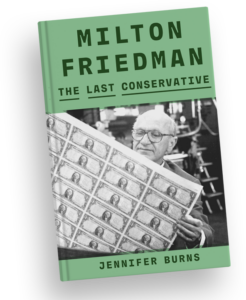
Fans of the economist Milton Friedman—myself included—should count themselves lucky that Stanford historian Jennifer Burns has written a comprehensive biography of him. Drawing on intensive archival research that only a patient and first-rate historian can do, she covers his intellectual life in its various stages, from his high school days to his death. Along the way, we see how he struggled in the 1930s and even, to some extent, in the 1940s, to understand his role in academia. Burns also shows in great detail the important influences in his life and, later, the many ways in which he influenced the economics profession and the broader world of politics—on taxes, monetary policy, social policy, and the draft, to name just four. most importantly.
His book is in no way a hagiography. She repeatedly criticizes Friedman, sometimes unfairly. She’s also a little unfair to his wife, Rose Friedman, herself an economist. But it makes Burns’s many positive assessments of Milton’s work all the more credible.
Although she is, as noted, a historian and not an economist, and sometimes makes small errors in her economic exposition, her overall understanding of economics is impressive, especially on one of the most difficult issues to understand: monetary policy. Indeed, she exposes the fact that the Federal Reserve does not directly control interest rates better than many economists I have read.
These are the first paragraphs of my goodbye from Jennifer Burns’ book Milton Friedman: The Last Conservative, Regulationsummer 2024.
As I explain towards the end of the review, I am not in love with the title of the book, to put it mildly. But that is not the most important part of my review. I praise many things in the book and criticize a few.
Read it the totality.


